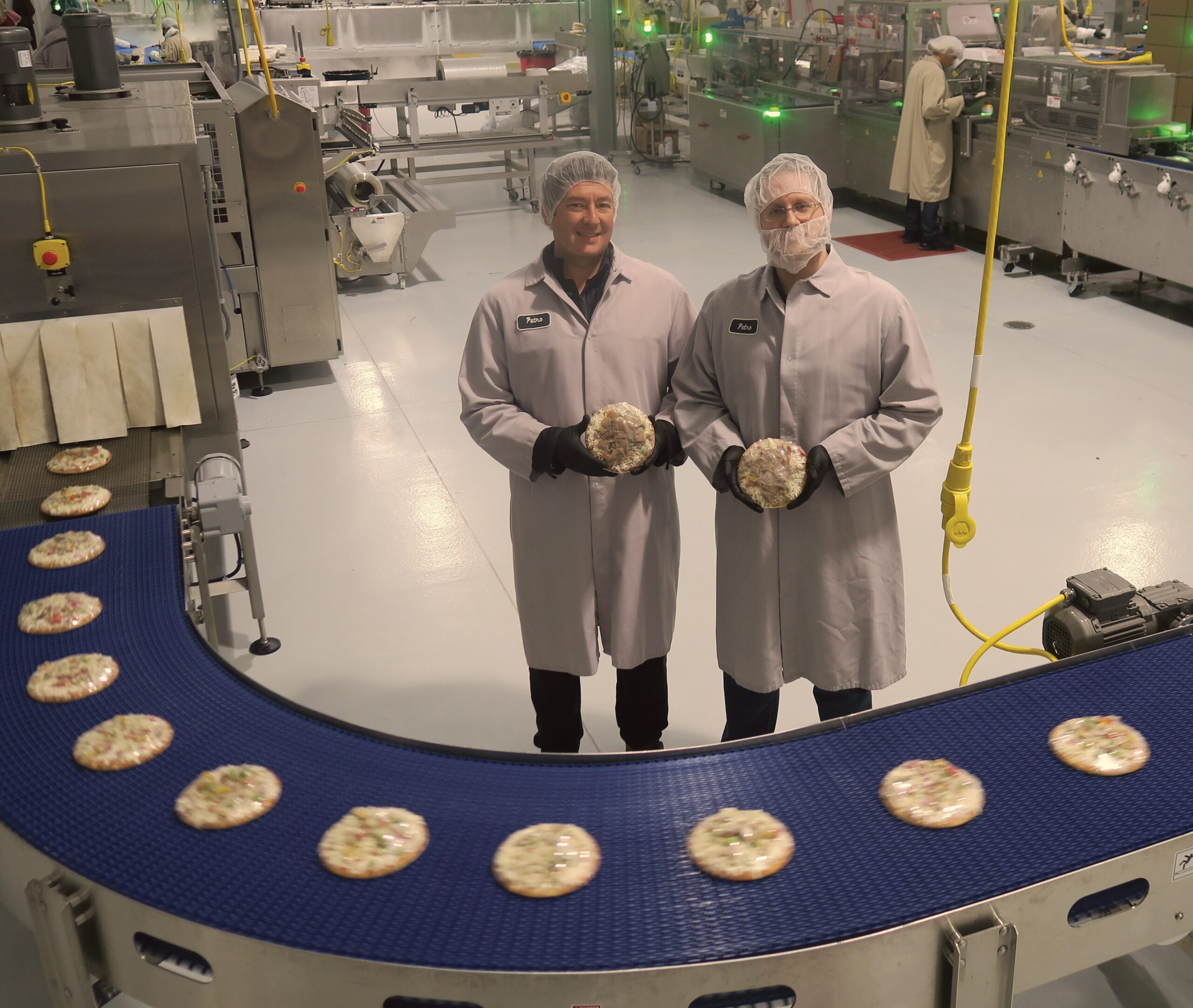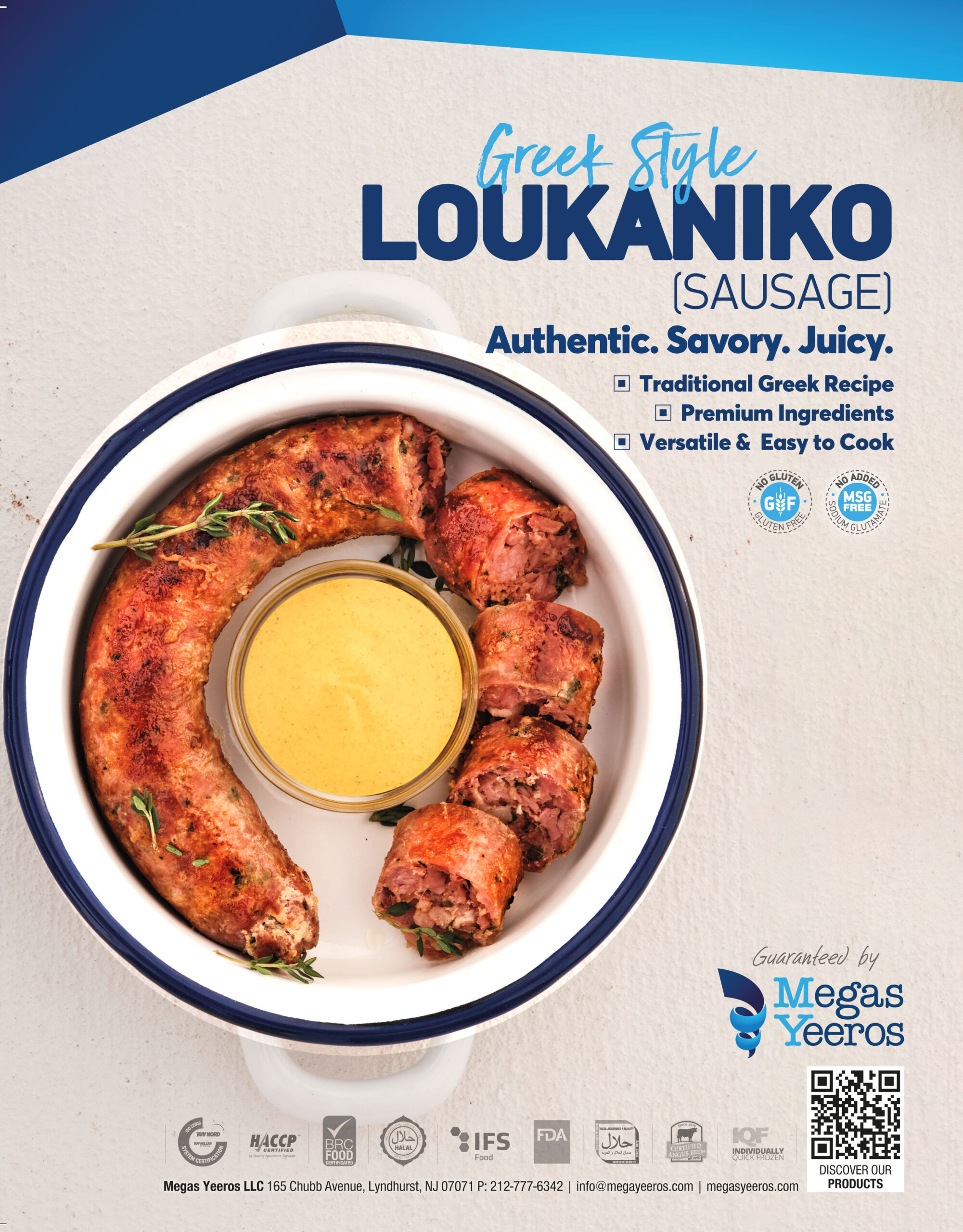Forward-Focused at 50
Posted by estiator at 11 October, at 15 : 05 PM Print
OLYMPIA FOODS, a giant in the Greek and Mediterranean specialty foods space, remains at the forefront of product development and technological innovation.
By Constantine N. Kolitsas
It’s hard to imagine an American foodscape without gyro. Once an ethnic curiosity, gyro has become so ingrained into the country’s culinary zeitgeist that fast-food giants like Arby’s have run national television campaigns around gyro promotions, while big box “wholesale” retailers like Costco market the product in their aisles. Indeed, up until the last decade or so, most of America enjoyed gyro only as a once-a-year treat—during annual visits to Greek church festivals.
How did it get from where it was 50 years ago to where it is today? A look at Olympia Foods, one of the country’s Big Four gyro producers, tells the story.
The year 2022 marks the official 50th anniversary of the origins of Olympia Foods. The creation story of Olympia Foods is a tale of two brothers from the mountains of Arcadia, Greece: Andre Papantoniou and his late brother, Kostas. It was in 1971 that the brothers opened the Acropolis Restaurant together on Sheridan Road in the Windy City. Andre, 24 years old at the time, and Kostas, one year his junior, were recent arrivals in the United States. Andre had been in the country just six years, while Kostas had only arrived earlier that year.
But the brothers quickly realized that their future wasn’t in the restaurant, but in producing gyro and pita for their fellow restaurant owners. It was from those years, in the early 70s, that the brothers figuratively and literally carved out the future of gyro, creating Olympia Foods and competing against the other three companies, all of which grew proportionally as the love affair that Americans have with gyro continued to evolve. The success of gyro, in fact, is the direct result of the groundwork laid by Andre and Kostas, along with that handful of other Chicago Greeks (and a non- Greek entrepreneur who saw the future of this Greek street food staple).
Flash-forward to today and the Papantoniou family is still at the helm of the company that the brothers built. With a full five decades under his belt, Andre remains very much hands-on, continuing to serve as CEO, while nephew Petros Kostas Papantoniou serves as Executive Vice President (Business Operations), niece Helen Papantoniou Pfeifle as Vice President (Employee Relations and Information Systems), and son Petros Andreas as Vice President (Plant Operations). Petros “K” has been with the company for 27 of its 50 years, while Helen and Petros “A” have each been with the company for 15 years. But as anyone who owns a family business knows, you’re part of the company from birth, living and breathing it all day, every day from the time you can form sentences.
“Remaining a true family business has been important to enable us to respond quickly to the needs of our customers,” says Petros K, indicating that the layers of bureaucracy that exist in most companies are not a part of Olympia’s culture. As a family-owned business, he says, there is freedom to make decisions quickly without rounds of approvals. “This comes into play especially when sudden shifts occur in the market, as we saw with Covid, as well as when scoping out the company’s long-term plans with regard to product innovations and investments to support our customers.”
And the continuity of remaining independent (and 100 percent privately held), without a history of disruptive mergers and acquisitions, has enabled the Papantoniou family to make investments and allocate resources that reflect what their customers need and the market demands.



When asked about Olympia’s secret to success and longevity, Petros says, “Our number one priority has always been and will always be the quality and consistency of our products.”
When Estiator visited Olympia in 2018, the company was ramping up for increasing demand for gyro with huge investments in its production capacity and warehousing. Giant rotisseries that cooked 1,400- pound cones of doner-style gyro were being installed to replace rotisseries that were already producing an unimaginable 500 pounds of gyro. At the time, Olympia had recently moved into a new 200,000-square-foot facility, and about a fifth of the space was marked off with signs that said things like “Future Room.” Just a few years later, and those rooms are all filled, says Petros—and they are expanding with an additional 50,000 square feet of warehouse space at a new building located just down the street.
Those 1,400-pound cones are used to produce the company’s “Off the Spit” product, a doner-style gyro made from ground beef and ground lamb that is one of Olympia’s core products. As the rotisserie spins the cone, the meat cooks, and as it reaches temperature, a robotic arm runs down the length of the assembly, slicing the cooked meat, which drops into a conveyor that moves it immediately into a deep freezer. The result is a product that is unrecognizable from gyro carved from cones cooking in the restaurant itself (of course, Olympia produces those as well). The Off the Spit version is popular, says Petros, because it saves labor and eliminates waste.
“Many operators find cooking cones on premises can be an intimidating process,” he adds. The Off the Spit product, he says, reaches a broader market because it enables an entirely new segment of the industry to introduce a first- rate gyro offering without having to invest in machinery, train personnel, observe ever-changing HACCP protocols, and develop expertise.
“Over the last few years, we see our customers moving toward simplifying their processes at the restaurant level,” he says. “Developing and now expanding the Off the Spit product is in response to those needs. But there’s much more going on at Olympia.
“We are also increasing production capacity,” says Petros K, whose latest project is adding robotics to the end of the line to speed up the packaging process as well as to keep up with demand. In the case of the company’s pita line, where product is currently packed into boxes by hand with some mechanization, the line will be fully automated by the time this article goes to press. “No hands will ever touch the pita,” he says.
Looking forward, the company is expanding its core business of gyro, pita, and sauces to include kebabs and keftedes (savory meat balls), with its line of halal products growing as well. (A recent report by Straits Research indicates that the global market for halal meats will grow from its current levels of $202 billion annually to $375 billion by 2030.)
Also in the pipeline, he says, are a line of fully made gyro sandwiches for retail, as well as Off the Spit packs. A new line of chicken and pork souvlaki will reflect trends taking place in Greece, where instead of a square cube of meat, the skewers are lined with rectangular cubes that are thinner on two of the opposing sides. The result is a product that cooks more quickly and requires just one turn instead of three. A “platinum” line of doner-style gyro is also in development. This product will be completely “clean label” (gluten-free and without MSG) to reflect the movement toward commercial foods that are more wholesome and friendlier to individuals with food sensitivities.
“The Greek explosion is happening all over,” says Petros K, “high-end, casual-dining, fast-food; it’s everywhere and across all segments,” with new customers adding Greek and Mediterranean products all the time. “We are now even packaging tzatziki in 1.5- ounce containers,” he says.
ORIGINS IN PITA
“My brother and I started producing gyros and pita breads for our own restaurant,” says Olympia founder and CEO Andre Papantoniou. “As gyro shops opened, we started selling pita to friends with restaurants. Some others wanted to buy from us, but we didn’t have the capacity to do much more. Before we knew it, we found ourselves in the pita business.” And so, the brothers decided to sell The Acropolis to focus on pita bread and, soon thereafter, gyro. Innovative and business-oriented, they went from making hand-produced pita breads to designing and operating the world’s first automated pita/flatbread line (the brothers hold several patents) within just three years. And as the public came to know and love the product, the line was soon running 24 hours a day, six days a week to satisfy demand. “In addition to supplying restaurants,” says Papantoniou, “we produced private label flatbreads for Pepperidge Farms and sold our products retail at Kroger [a Midwest based grocery chain].”
Pepperidge Farms would not be the only national brand turning to Olympia. Among many others was Taco Bell, whose line of gorditas and chalupas was developed from flatbreads produced for the national chain by Papantoniou’s company.
“Through experience, we learned how to mass-produce pita breads and still have the handmade effect,” he says. Pitas, flatbreads, pocket breads, pizza crusts; they are all a part of Olympia’s bakery portfolio, to which “Artopita,” an all-natural, preservative-free pita bread, was added a few years ago.
More flatbread products are in development, says Petros K, while the company is continuing to evolve its pizza business. “We’ve always been in the pizza crust business,” he elaborates. “Now we’re producing fully topped pizzas as well.” Produced on a fully automated state-of-the-art line capable of producing more than one hundred pizzas per minute, the company’s line of topped pizzas is sold at schools, universities, hospitals, and corporate kitchens.
The product is so good, says Petros, that restaurants are increasingly turning to Olympia’s pizza crusts and flatbreads as a way to manage escalating labor and food costs. Asked if consumers will see the Olympia brand of pizzas in grocery stores, he confides that while their pizza crusts are currently produced under co-packer arrangements, he fore- sees a future where that might change.
As is evident, the story of gyro and pita that began 50 years ago among four competitors is going stronger than ever with adoption of the Greek street food by the American (and global) public, continuing to grow in leaps and bounds. And with its first 50 years under its belt, Olympia Foods is a company whose future is as vital, focused, and driven as the family that has stewarded it to its current level of greatness.














